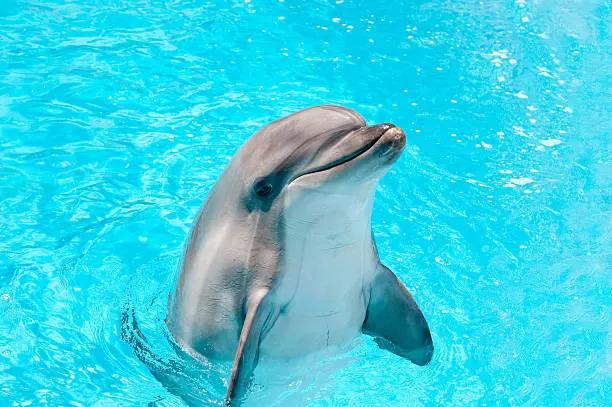When we think about intelligence in the animal kingdom, primates like chimpanzees often take the spotlight. But there’s another contender from the ocean depths that might surprise you—the bottlenose dolphin. These sleek marine mammals are not only playful and social but are also considered one of the smartest species on Earth, second only to humans in many ways.

Meet the Bottlenose Dolphin
The bottlenose dolphin (Tursiops truncatus) is perhaps the most familiar dolphin species, known for its friendly face, curved dorsal fin, and remarkable acrobatic leaps. Found in warm and temperate seas worldwide, these dolphins can grow up to 4 meters long and live for 40–60 years in the wild.
But their physical traits are just the beginning. It’s their cognitive abilities that have left scientists in awe.
Brain Power: Big Brains, Big Thoughts
Bottlenose dolphins have one of the largest brain-to-body ratios in the animal kingdom—second only to humans. Their neocortex, the brain region responsible for higher-order thinking, is highly developed. Even more fascinating, dolphins possess a complex limbic system, which governs emotions, empathy, and social bonding.
Some experts believe that dolphins may experience self-awareness, empathy, and even grief, much like humans.
Dolphin Language: Is It More Than Clicks and Whistles?
Communication among bottlenose dolphins is astonishing. They produce a wide range of clicks, whistles, and body movements, which they use to express identity, emotions, and instructions.
- Each dolphin has a unique signature whistle, essentially a name they use to identify themselves.
- They can remember these "names" for decades, even after being separated from others.
- Studies have shown that dolphins may combine sounds in structured ways, hinting at the early form of syntax—a key element of human language.
Tool Use and Problem Solving
Bottlenose dolphins use marine sponges to cover their snouts while foraging on the seafloor. This helps protect them from sharp objects and stingrays—a clear example of tool use, once thought to be limited to primates and humans.
In captivity, they’ve been observed solving complex puzzles, understanding abstract concepts like numbers, and even teaching others how to complete tasks. Their ability to learn behaviors through imitation is unmatched among marine species.
Social Intelligence: The Dolphin Society
Living in pods, bottlenose dolphins show high levels of cooperation and social structure. They form strong friendships, hunt together using coordinated strategies, and even display acts of altruism—like helping injured companions or guiding lost whales.
Some researchers have compared their social systems to primitive human societies, complete with alliances, rivalries, and group dynamics.
Mirror Test: Do Dolphins Recognize Themselves?
Yes! Bottlenose dolphins have passed the mirror self-recognition test, a hallmark of self-awareness. When marked with a temporary dye and shown a mirror, they investigate their bodies, indicating they understand the reflection is themselves—not another dolphin.
Only a few species—including great apes, elephants, magpies, and humans—have passed this test, making dolphins truly special.
So, Are They the Smartest After Us?
While intelligence is difficult to quantify across species, bottlenose dolphins check nearly every box:
Complex language
Tool use
Social cooperation
Problem-solving
Self-awareness
Emotional intelligence
These traits position them as arguably the most intelligent non-human animals alive today.
The ocean still holds many secrets, but one thing is clear: bottlenose dolphins challenge everything we thought we knew about non-human intelligence. They remind us that intelligence comes in many forms, and that the line between human and animal cognition may be far thinner than we believed.
So next time you see a dolphin leaping joyfully through the waves, remember—you might just be witnessing one of Earth’s brightest non-human minds at work.